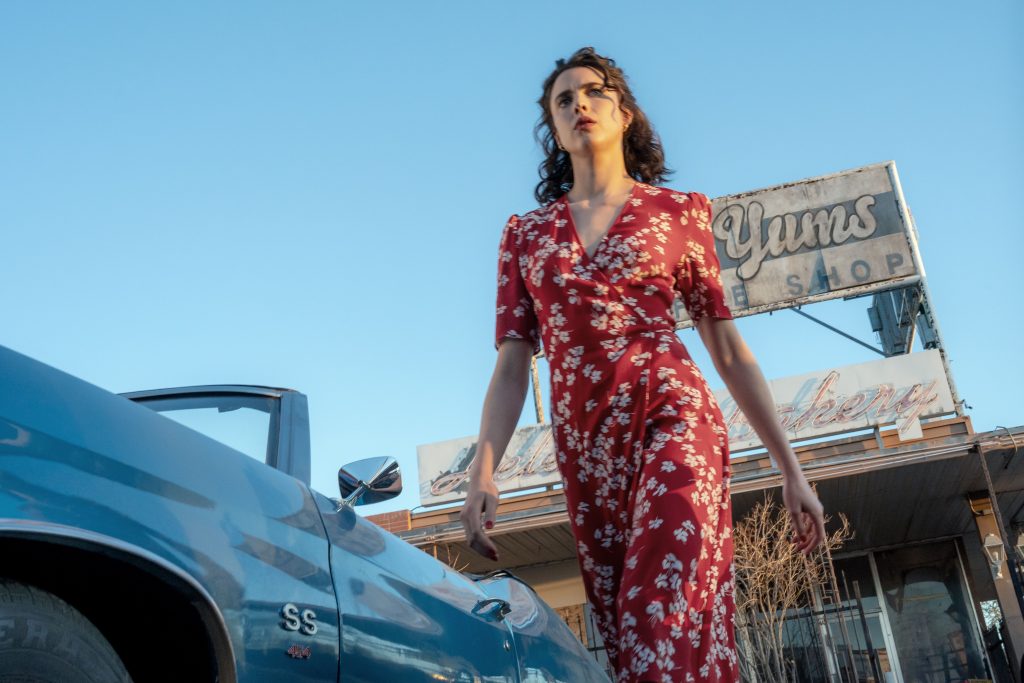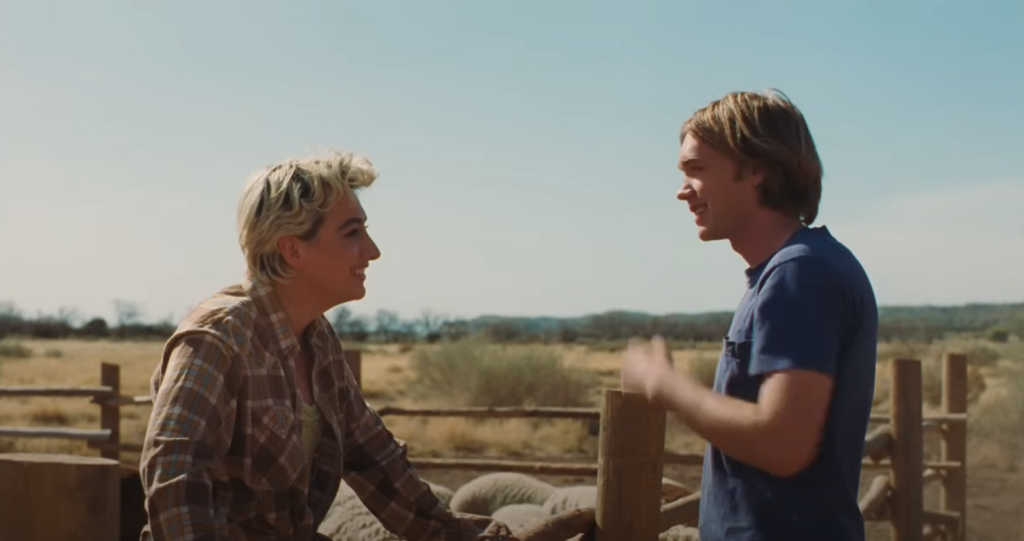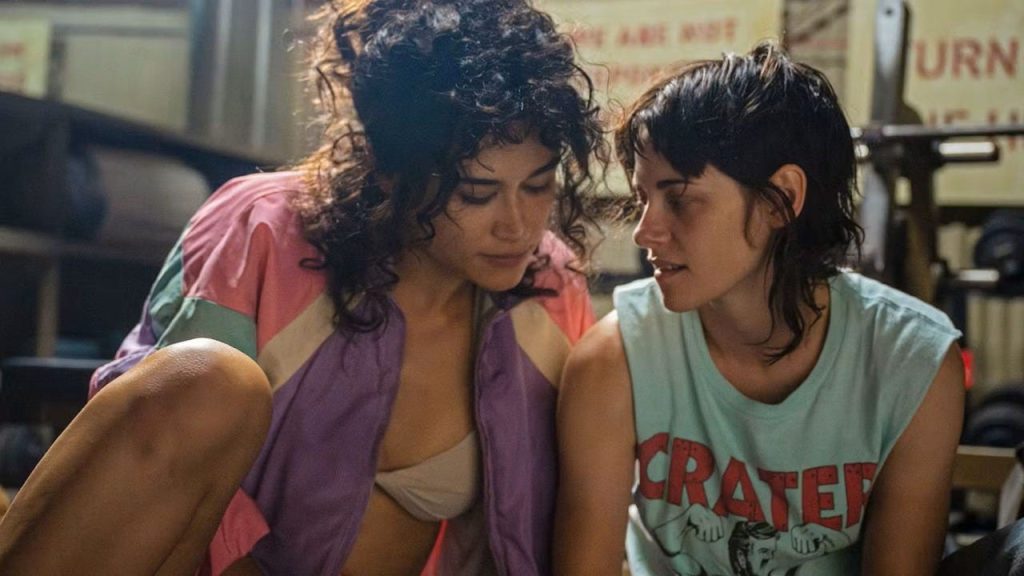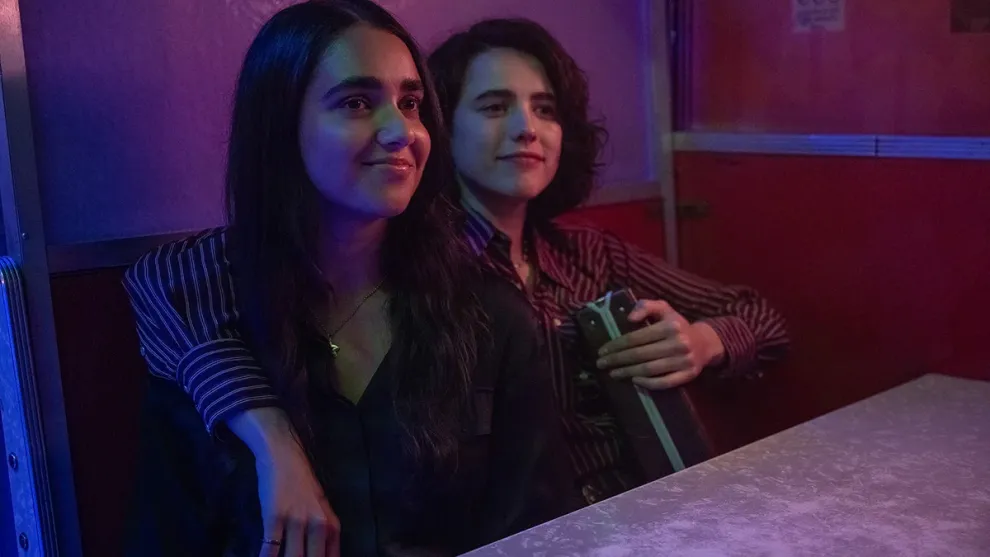A year and a half after the movie studio marketers insisted on misnaming Drive-Away Dolls, Ethan Coen and Tricia Cooke have made good on the second part of their promised “lesbian trilogy.” And hoo, boy. Honey Don’t is something.
It’s clear now that Henry James’ Drive-Away Dykes (Coen and Cooke’s obviously superior title) was only a test run for their little foray into B-movie exploitation. Drive-Away Dykes might have been a road movie, but it didn’t open up the throttle quite like Honey Don’t. Instead of DAD’s amiable, charming pace, Honey puts the pedal to the metal, blows out the cobwebs, and bombs down the bleak, desolate streets of Bakersfield, CA like it could be the last ride.
Everything audiences and critics found divisive about DAD is amped up – sleazier, sexier, darker. Scenes of violence cross the line into slapstick and then spit gleefully across it. Bodies drop with the abandon of “serious” Coen brothers movies like Miller’s Crossing and No Country For Old Men. And while there’s no suitcase full of dildos, there’s no shortage of sex.
What’s not to like?
So What Happens in Honey Don’t?
Honey Don’t joins the grand tradition of film noir plots that make little to no sense and honestly shouldn’t even be possible in the age of smartphones. There’s no Macguffin like Drive-Away Dykes’ suitcase. Instead, there’s a whole smorgasbord of red herrings and dangling plot lines that Coen and Cooke expect us to roll with in exchange for the privilege of spending 90 minutes with Honey.
Count me in the camp that would happily spend 90 minutes with Honey every few years, the way Rian Johnson is doling out delicious bites of Benoit Blanc.
However, where Johnson’s plots are as tight as German engineering, Honey Don’t is a twitchy Rube Goldberg device that distracts your attention away when the parrot stubbornly turns its nose up at the cracker and the marble careens off the track.
Honey Don’t opens with one of the smoothest sequences in the Coen canon. A stylish young women on a Vespa – straight out of Wes Anderson – calmly approaches a desert car crash and removes a ring from the finger of the dead woman suspended upside down in the overturned car.
This is Chere (Lera Abova), and you’d be forgiven for thinking the movie is going to be about her. The ring she retrieves, we soon learn, is the logo of The Four-Way Temple, a seedy church run by con artist and drug trafficker Reverend Drew Devlin (Chris Evans). And the woman formerly wearing the ring, Mia Novotny, was just one day away from becoming a client of private investigator Honey O’Donahue (Margaret Qualley).
Honey takes an interest in the crash after Mia doesn’t show up to their meeting. Honey is assisted, hampered, or harassed by a stable of oddball characters, all demonstrating how a casting director can make or break a movie.
Inept homicide detective Marty Metakawich (Charlie Day) takes more time trying to weasel a date out of Honey than investigating a transparently fishy car accident. When she repeatedly asserts, “I like girls,” he scoffs “You always say that!,” apparently mistaking it for a flirtatious running joke between them.
It’s an undisputable fact, however. A visit to the local precinct’s evidence room introduces immediate sparks with Aubrey Plaza’s MG Falcone. The trailer made a moment of Plaza’s instantly iconic “Love those click-clacking heels,” but it plays even better in context, Qualley’s face flickering with curiosity.
Later, when Honey finds MG drinking in a cop bar, they share one of the sexiest scenes in recent memory – fully clothed, sotto voce, surrounded by oblivious dudes, while MG edges Honey under the bar. When MG licked her fingers (coconut oil, according to an interview), the theater let out a collective sigh, and I asked my skeptical cinema companions “Is it getting better?” Immediate and unconditional agreement.
Honey Don’t bears the hallmarks of a Coen Brothers movie, but very queer and extremely horny.
The case – if it’s a case at all, which is never quite clear even to Honey – becomes personal when Honey’s rebellious niece Corinne (Talia Ryder) disappears after a shift working the drive-through at Weiner Heaven (Yep. There’s subtlety in Honey Don’t, but that’s not it).
Is it Corinne’s abusive boyfriend Mickie? Nope, but Honey works him over in a frankly satisfying scene punctuated by slapping a feminist bumper sticker on his truck.
What about the creepy old man stalking Corinne? No, that’s Honey’s estranged father, trying to reach out to his grandchildren despite a total lack of social or self-awareness.
Is Corinne’s disappearance connected to the Four-Way Temple, which seems to prey on lonely young women desperate for validation? That seems likely, but Honey’s confrontation with Reverend Drew reveals nothing but Drew’s bottomless sexual appetite. (He, too, is unconcerned that Honey likes girls.)
When the twist comes (spoilers later, watch your back), you might think it comes out of nowhere. It doesn’t – Coen and Cooke have been giving you hints all along. But, like Honey, you may have been a little distracted. That’s fair. MG is very distracting.
But What is Honey Don’t Really About?
As Coen said of Drive-Away Dolls – “a movie kind of with nothing on its mind, but also with everything on its mind” – Honey Don’t has some dark, timely themes just beneath the surface. The Coen Brothers movies always turned a critical eye to the “bumbling men” who wreak havoc and wreck lives with their hubris and hypocrisy. It’s as visible in tragedies like Fargo as in farces like The Ladykillers. But the lens of a suave sapphic fantasy highlights the patriarchal forces and misogynistic assumptions that keep Marty Metakawich in a job and help Reverend Drew prey on his parishioners.
Honey Don’t continues one key theme set in Drive-Away Dykes – a blunt-force satire of American evangelical Christianity. Here in the worst timeline, where the Bible-thumpers seem to be winning and LGBTQ+ rights are targeted, any shots fired bring joy to certain of us queers raised in that stifling swamp.
As Reverend Drew, Chris Evans continues to show why he made a perfect Captain America – because the difference between righteous and self-righteous is whisper thin. His narcissistic sleazeball characters in Knives Out and Honey Don’t are perfect mirror reversals of Steve Rogers, as venal and cruel as Cap is noble and selfless.
Reverend Drew serves the same purpose as Drive-Away Dykes’ Senator Gary Channel – a paragon of the depravity white men can justify for themselves. When you take away the charm and good looks, Reverend Drew is truly nothing – petty, gross, and pathetic. His comeuppance is so inevitable and banal you might be forgiven for missing it.
Some critics have complained about how abruptly the Four-Way Temple plotline gets severed, but to my eyes, that’s the point. So very Coen-esque to distract us with the good reverend while seducing us away from the real reveal.
Here comes the spoiler, so get the fuck out of the way: When MG finally reveals her role in the murders, her psychopathic desire to free these women from the grips of religion caps off the theme. Channeling her own childhood abuse and religious trauma into vengeance, MG becomes another agent of patriarchy, twisting feminist-sounding sentiments into misogyny.
It’s a depth of irony that could only have come from Cooke – Coen already proclaimed himself too “straight and stupid” for the lesbian trilogy. By liberating troubled women with death, MG effectively makes herself an agent of patriarchy.
Is Honey Don’t Worth Seeing?
What makes a movie worth seeing? How about a young actor who is rapidly shaping into a generational star?
I don’t know if Margaret Qualley is saving sex in cinema or redefining Hollywood stardom, but I’ll tell you one thing – call her a nepo baby and you’ll have a fight on your hands. Being Andie McDowell’s daughter couldn’t have hurt, at least as far as getting a foot in the door. But as the lead, title character – carrying the movie on her vintage-draped shoulders – she demonstrates all the wit, charm, and intellect that made her mother an icon.
Qualley is electrifying in every scene she’s in, which probably saves the movie, considering she’s in nearly every scene. And the chemistry between Qualley and Plaza makes “palpable” an understatement. Plaza puts her versatility on display with MG, taking her through an 11th-hour shift that some critics have complained is too abrupt but was always lurking in her performance.
Special recognition: Gabby Beans, as Honey’s extraneous assistant Spider, lights up the screen in her every appearance. (Note, Spider is only extraneous because Honey is such a control freak that she doesn’t even let Spider answer the phone for her.) If Coen and Cooke have any interest in correcting one of the most legit criticisms of the Coens’ movies – their overwhelming whiteness – Gabby Beans deserves to be bumped up to full partner in their follow-up.
All in all, Honey Don’t bears the hallmarks of a Coen Brothers movie, but very queer and extremely horny. Tricia Cooke has brought out a side of her husband that no one could have imagined back in 2018, when Ethan and Joel made their last film together (for now at least).
With the lesbian trilogy, we get to enjoy the fruits of two middle-aged artists who have paid their dues and are having the time of their lives. They’re not pretending these movies are masterpieces – the Coen Brothers and Cooke (their editor since 1990) have made their share of those already.
Instead, they’re blasts of surreal energy and subversive fun. Like the exploitation movies of yesteryear, they sneak heavy themes into raw, slutty packages of sex and violence.
The next one is about the reunion of a college rowing team. It’s called Go, Beavers! If I could buy tickets now, I would.



